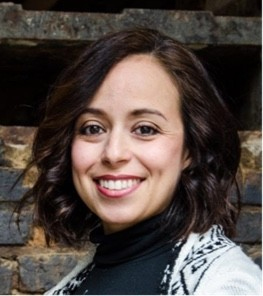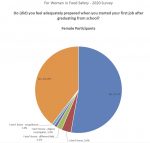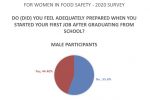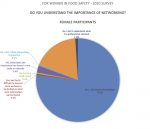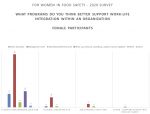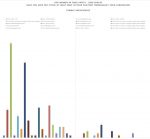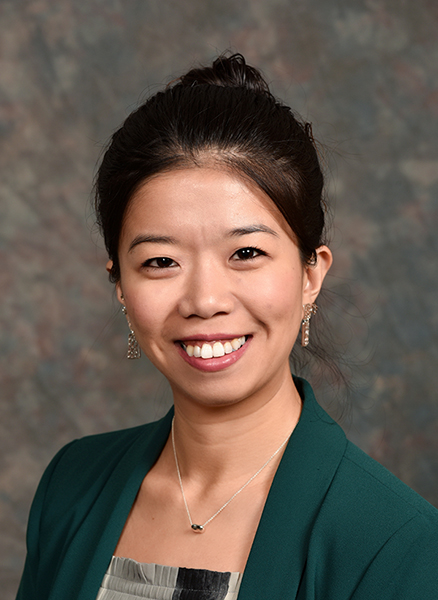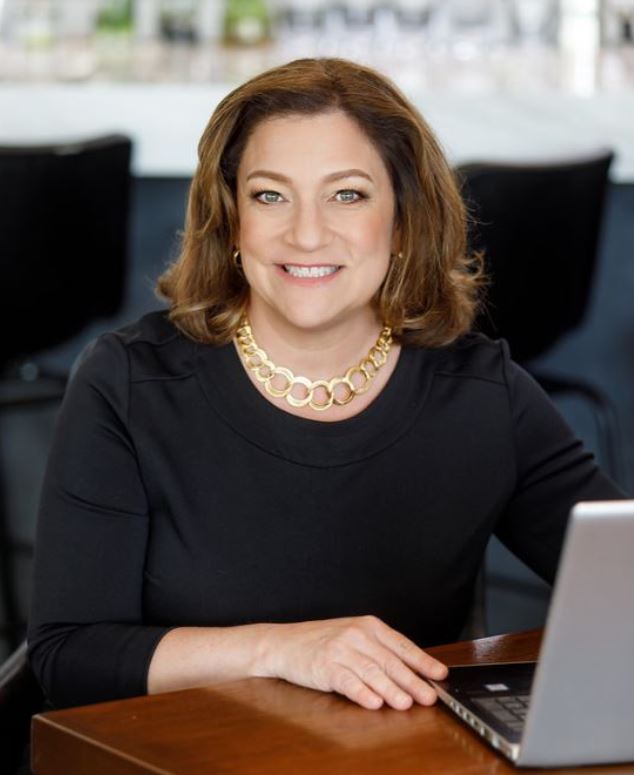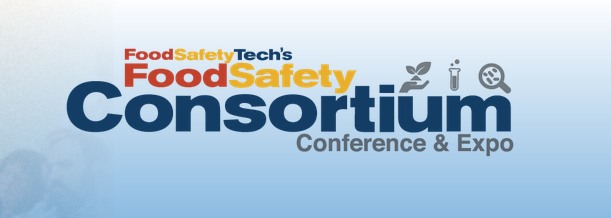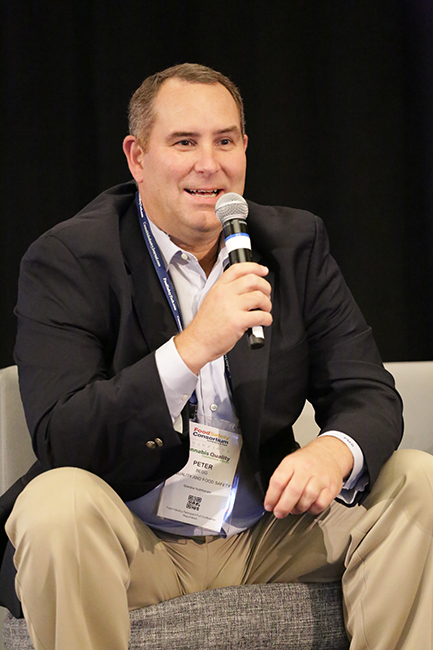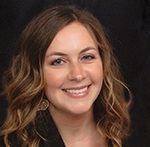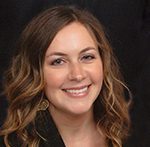In an effort to continue supporting female professionals contributing to the food safety industry and better understand their feelings and experiences while going through different stages in their career, we released our first survey in September 2020. The results will help us provide better resources to address the challenges and barriers reported from the survey.
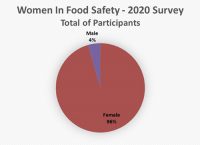
The participation received from the leaders in food safety who completed the survey was significant. We were humbled and excited to notice that within a couple of weeks of launching the survey, 201 responses were received from 19 different countries. Although the survey was intended to assess the situations and experiences women are going through or have gone through, responses from their counterparts, male leaders, were also received. Ninety six percent of the responses are from females. (see Figure 1).
The key survey results were shared and discussed during the “We Asked, You Answered- The Voice of Women In Food Safety” panel session (view complimentary webinar recording) at the Food Safety Consortium Virtual Conference Series on November 5. The following are the insights we gained from the responses.
| Position Levels | Percentage (%) |
| Senior executive | 14.9 |
| Management | 61.7 |
| Administrative/Entry level | 6.5 |
| Other (Students) | 1.5 |
| Other (CEO) | 0.5 |
| Other (Research, consulting, auditor, trainer, regulatory) | 14.9 |
| Table 1. Responses by Position Levels | |
The survey participants hold positions at all professional levels and years within an organization. 61.7% of the total responses are linked to management levels, but only 14.9% are Senior Executive Level (see Table 1). Years of experience were broken down into five categories (see Table 2); 68.2% of the respondents had more than eight years of experience.
| Years of Experience | Percentage (%) |
| 15+ | 38.8 |
| 8–15 | 29.4 |
| 5–8 | 11.9 |
| 2–5 | 13.4 |
| 0–2 | 6.5 |
| Table 2. Responses by Years of Experience | |
Well-rounded questions were provided in the survey, including situational inquiries, career advancement and the obstacles presented when entering the job market. In addition, opinion-based questions were formulated to understand how extensive networking is leveraged as a developmental and career advancement tool; it also addressed some of the expectations hiring managers have when hiring talent versus what the expectations professionals had when looking for their first jobs. Last but not least, a set of experience-based questions related to the encountered barriers found throughout the career journey, what is attributed to career success, the importance of diversity, and what are the career pivot points when life and career changes come up, were also presented.
With regards to preparedness after graduating from educational training and starting a first job, similar responses were provided between females and males. Women provided three different responses: 54.2% felt they were/are not adequately prepared; 40.6% feel were/are well-prepared; and 7.7% of women did not know their level of preparation; this can be attributed to no guidance received to better navigate the transition from school to the workforce and not being able to completion an educational degree (see Figure 2). Similar to women, 55.6% of men feel they were not adequately prepared; however, the remainder of male responses (44.4%) did not find any issues with the transition to their first job from school (See Figure 3).
The experience all participants shared regarding the obstacles presented when entering the job market revealed that, in general, 52.7% of the participants find a lack of connection with a company-experienced employee is the primary obstacle, 49.3% associate the obstacle to lack of connection to industry while attending school, and nearly 30% of participants indicate that they are lacking credentials to meet the job requirements (i.e., not having enough experience for required certifications). In this question, there two additional responses were reported: 15.4% of women did/do not know where to start and 4.5% did/do not know what qualifications the industry is looking for (See Figure 4).
The highlight between female and male responses for this question is the lack of credentials to meet the job requirements as an obstacle to a successful job initiation. In this case, a higher percentage of men (44%) reported this issue as an obstacle compared to the responses submitted by women (29%).
In terms of understanding the importance of networking, 76% of women confirm that they know how to master the skill of networking, but nearly 18% do not know how to start building their network. Additionally, there were a couple of responses from females confirming their understanding of the importance of networking; however, it is only to some extent and they have difficulty connecting with others due to the skill not coming naturally or having some limitations in terms of information sharing (see Figure 5). Only 1% of female responses reported not understanding exactly what a professional network is; whereas 100% of male respondents indicate no issues with understanding the important of networking.
When it comes to the topic of diversity and its importance within a company, 83.3% of female participants said diversity is important to them. Detailed responses are in Table 3.
| Is Diversity within a Company Important to You? | |
| 11% | Not important |
| 9% | Do not know |
| 2% | Do not know/Would not weigh diversity higher than finding the right candidate |
| Table 3. Percentages taken out of 192 female responses. | |
For females, significant career barriers did not fall under a single-specific category. The responses submitted identify 13 different barriers where work/life demands (41%), feeling of the glass ceiling (41%) and education/degree (5%) are found to have a greater concern among others, including students (see Figure 6.). Other barriers, such as soft skills, lack of support from management and lack of opportunity near family are categories that were mostly reported from women holding management level positions (see Figure 7.)
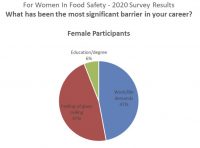 |
 |
| Figure 6. The most significant career barriers. | Figure 7. The most significant career barrier among all level positions among female participants. |
In the case of men, work/life demands are recognized as the career barrier of most concern among senior executives (56%). In addition , only other two reasons are reported as barriers: The feeling of a glass ceiling (reported by senior executive level and administrative/entry level) and diversity (reported by management level position) (see Figure 8).
Regarding the contributors to career success, self-learning/motivation is the leading category. This is followed by job experience and working with a mentor (see Figures 9 and 10). The main difference between women and men regarding their career success is educational degree, and being persistent and having patience. In this case, female responses outlined that being persistent and having patience is a success factor.
Life and career changes cause stress and disharmony in a person’s life, requiring a modification in job performance and handling of personal responsibility. The concern between men and women differs considerably. While men are more concerned about job reassignments/promotions, extensive traveling, and relocation; women reported they have 11 additional reasons to be concerned. Motherhood or taking care of dependents are the leading issues. (see Figure 11).
The survey also included inputs on what programs would better support the integration of work and life harmony within an organization. Flexible time/working location is found as the primary need from female responses in all position levels. Then, flexible/unlimited personal time off is the second identified need submitted in their responses. In addition, women in management level positions were the demographic responding to all four provided responses. This was contrary to senior executive women who found flexible time/working location as the only category to better support work integration and life harmony (see Figure 12). In the case of men, only two responses provide insight as to their need for support; 88.9% of them would like to have more flexible time/working location and 11.1% consider being part of the workload allocation process beneficial.
From all responses received, about 90% have felt stuck at least once in their position throughout their career or job. Females in management level positions with working experience of eight years or more lead the number of responses (see Figure 13). There is a higher percentage of males (22%) who have not felt stuck in their career compared to the response submitted by females (10%). Male senior executives with more than 15 years of experience have the higher number of responses (see Figure 14).
The survey also included ranking questions to understand what the expectations were/are among the participants related to their first job. Table 4 outlines the five expectations the participants chose from when answering this question, highlighting that 183 out of 201 participants place opportunities to grow at the highest level of importance. Social networking rated the lowest (81 out of 201) in importance among the total responses received. In term of gender-specific answers, both women and men identified opportunities to grow as the expectation with highest level of importance. For women, the expectation with lowest level of importance is social networking; for men, competitive salaries, and opportunities to use what you learned from school are the not-so important expectations (see Figures 15, 16, 17 and 18).
In term of gender-specific answers, both women and men identified opportunities to grow as the expectation with highest level of importance. For women, the expectation with lowest level of importance is social networking; for men, competitive salaries, and opportunities to use what you learned from school are the not-so important expectations (see Figures 15, 16, 17 and 18).
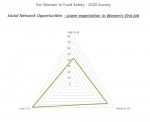 |
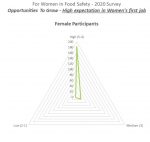 |
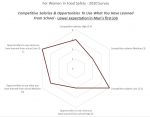 |
 |
| Figure 15. Importance of expectation on the first job (female participants). | Figure 16. Opportunities to grow (female participants). | Figure 17 and 18. Male participants | |
The expectation from participants regarding what is the level of importance when hiring new graduate employees highlights “complete the tasks as instructed” as the highest expectation among the 201 participants and experience through internships as the lowest level of importance (see Table 5).
 In addition to the five options for answers, women also included three additional expectations:
In addition to the five options for answers, women also included three additional expectations:
- Understanding of company culture and when is a good time to look for a new opportunity
- Ability to solve problems, analytical thinking and get results independently
- Learning mindset
Conclusions
Responses from 19 different countries were received from the survey with 96% being from females. Among all position levels provided their inputs, but the largest participation was from women holding management level positions (62%). With regards to the categories on years of experience, those with more than 15 years of experience had the higher percentage of participation (39%), but only 15% were senior executives.
Some key preliminary outcomes are reported as follows:
- Self-learning and motivation are two leading drivers for career success.
- Work/life demands and feeling of a glass ceiling are identified as the main career barrier among women and men. Educational degree is a reported concern specific to women and diversity is specific to men.
- There are no significant differences between females and males regarding not feeling adequately prepared when starting the first job (52.4% – female; 55.6% – male).
- 52.7% of all participants find a lack of connection with a company-experienced employee as the main obstacle when entering the job market. Lack of credentials is a significant obstacle for males (44.4%) vs. females (29.2%).
- 100% of male responses said they mastered the skill of networking vs. 76% from female responses.
- There are no significant differences between females and males regarding not having any issues when transitioning to their first job after graduating from school (41% – female; 44% – male). However, 7.7% of women do not know if they were/are prepared.
- Flexible time/working location named as the primary need as people believe it would better to support integration of work and life harmony among all position levels.
- 90% of participants felt stuck at least once in their position throughout their career or job. A higher percentage of men (22%) confirmed not feeling stuck in their career compared with the responses submitted by women (10%).
- All responses identified opportunities to grow as the expectation with highest level of importance when first starting a career. For females, the expectation with lowest level of importance is social networking. For men, competitive salaries and opportunities to use what they learned in school are not important expectations.
- The expectation among the 201 participants on what is important when hiring newly graduated employee report completing the tasks as instructed as the highest expectation and placed experience through internships as the lowest level of importance.

